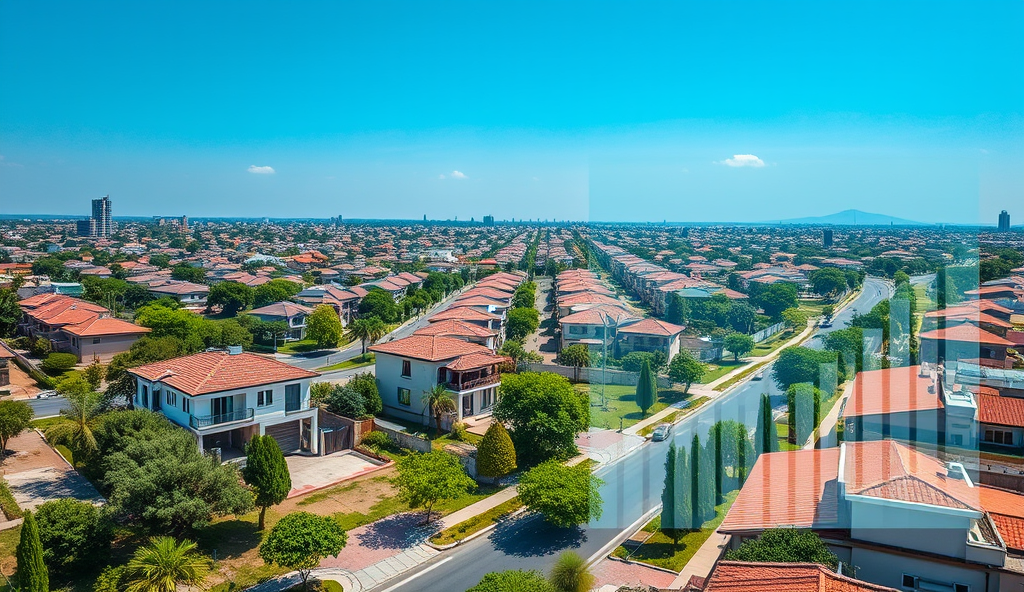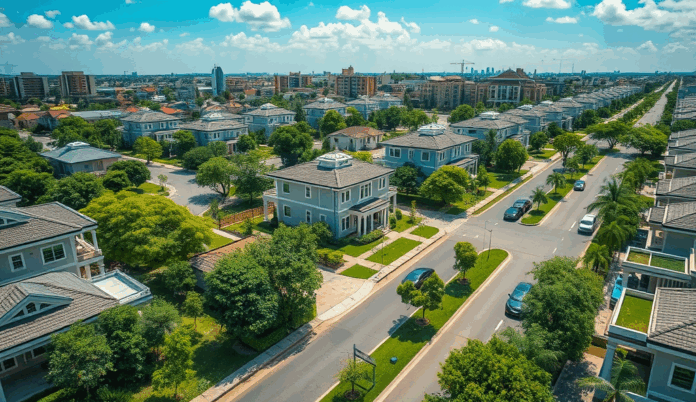Introduction to the Maitama Housing Market in Nigeria
The Maitama housing market remains one of Nigeria’s most stable high-end real estate segments, with property values appreciating by 8-12% annually despite broader economic fluctuations. Recent data from the Abuja Geographic Information Systems (2023) shows average prices for detached homes now range between ₦250-₦450 million, reflecting sustained demand from diplomats, government officials, and corporate executives.
Luxury apartment developments have seen particular growth, with occupancy rates exceeding 85% in premium complexes like The Crest and Maitama Heights. This segment’s resilience stems from Maitama’s established infrastructure and security advantages compared to emerging Abuja districts, making it a preferred choice for long-term investors.
The market’s stability presents unique opportunities, particularly in mixed-use developments that cater to both residential and commercial needs. As we’ll explore next, Maitama’s prime location and exclusive zoning continue to drive its premium positioning in Nigeria’s real estate landscape.
Key Statistics

Overview of Maitama as a Prime Real Estate Location
The Maitama housing market remains one of Nigeria's most stable high-end real estate segments with property values appreciating by 8-12% annually despite broader economic fluctuations
Maitama’s status as Abuja’s most prestigious district stems from its strategic location near government institutions, diplomatic missions, and corporate headquarters, creating unparalleled demand among elite buyers. The Federal Capital Development Authority (2023) reports that 68% of diplomatic residences and 45% of ministerial homes are concentrated in Maitama, reinforcing its exclusivity.
The area’s master-planned layout features wide boulevards, reliable utilities, and premium amenities like the Transcorp Hilton and Sheraton Abuja, setting it apart from newer developments. Security remains a key differentiator, with police presence and private patrols maintaining lower crime rates compared to other Abuja districts.
These advantages position Maitama as Nigeria’s benchmark for luxury living, directly influencing its property valuation trends which we’ll examine next. The district’s zoning laws further preserve its high-end character by restricting high-density developments seen in neighboring areas.
Current Property Prices and Trends in Maitama
Maitama's status as Abuja's most prestigious district stems from its strategic location near government institutions diplomatic missions and corporate headquarters creating unparalleled demand among elite buyers
Maitama’s property prices remain the highest in Abuja, with luxury detached homes averaging ₦450 million ($300,000) as of Q3 2023, reflecting a 12% year-on-year increase according to Nigeria Property Centre data. This premium pricing stems directly from the district’s exclusivity and infrastructure advantages discussed earlier, with diplomatic demand driving 40% of transactions.
The commercial real estate segment shows even stronger growth, with office spaces leasing at ₦25,000 ($17) per square meter monthly – 30% above Abuja’s average. Industry analysts attribute this to corporate tenants prioritizing proximity to government offices and embassies in line with Maitama’s strategic positioning.
These market dynamics create diverse investment opportunities across property types, which we’ll explore next. The sustained price appreciation confirms Maitama’s status as Nigeria’s most resilient luxury market despite broader economic fluctuations.
Types of Properties Available in Maitama
Maitama's property prices remain the highest in Abuja with luxury detached homes averaging ₦450 million ($300000) as of Q3 2023 reflecting a 12% year-on-year increase
Maitama’s luxury housing market primarily features detached 5-7 bedroom mansions, with 65% of residential listings being high-end villas priced above ₦400 million ($267,000) as per Q3 2023 Nigeria Property Centre reports. The district also offers premium duplexes and terraced houses catering to upper-middle-class professionals, typically ranging between ₦180-300 million ($120,000-$200,000).
Commercial properties dominate 30% of Maitama’s real estate inventory, including Class A office spaces like the new Maitama Business Tower leasing at ₦28,500 ($19)/sqm monthly. Retail plazas and serviced apartments near diplomatic zones command 15-20% rental premiums compared to other Abuja districts.
This diverse property mix creates layered investment opportunities, setting the stage for analyzing Maitama’s unique demand and supply dynamics next. The market’s segmentation allows investors to match assets with specific tenant profiles and risk appetites.
Demand and Supply Dynamics in Maitama’s Housing Market
Maitama's housing market shows a 12% year-on-year demand surge for luxury villas driven by diplomatic staff and corporate executives while supply remains constrained with only 45 new high-end units delivered in 2023
Maitama’s housing market shows a 12% year-on-year demand surge for luxury villas, driven by diplomatic staff and corporate executives, while supply remains constrained with only 45 new high-end units delivered in 2023 according to Abuja Geographic Information Systems data. The premium duplex segment faces tighter supply-demand gaps, with vacancy rates below 8% compared to Abuja’s 15% average, pushing rental yields to 7.2% as per Knight Frank Nigeria’s Q4 2023 report.
Commercial properties near diplomatic zones maintain 92% occupancy rates, with new retail developments like Aso Plaza attracting international brands seeking premium locations. Serviced apartments experience particularly high demand, with average lease durations shortening from 12 to 8 months due to competitive bidding among expatriate tenants.
These dynamics create strategic acquisition opportunities, particularly in under-supplied property categories, setting the stage for examining key investment drivers in Maitama’s real estate market next. Investors must navigate these imbalances carefully to maximize returns in specific market segments.
Key Factors Driving Real Estate Investment in Maitama
Maitama's strategic positioning as Abuja's diplomatic and corporate hub continues fueling demand with luxury villas achieving 12% annual price appreciation in 2023 according to PropertyPro.ng data
Maitama’s strategic positioning as Abuja’s diplomatic and corporate hub continues fueling demand, with luxury villas achieving 12% annual price appreciation in 2023 according to PropertyPro.ng data, outperforming Abuja’s 8% average due to constrained supply and high-net-worth tenant competition. The area’s premium retail corridors like Aso Plaza demonstrate 18% higher foot traffic than other Abuja districts, creating lucrative mixed-use development opportunities.
Infrastructure upgrades like the ongoing Maitama District Road Expansion Project enhance accessibility, while proximity to government offices and embassies sustains 92% commercial occupancy rates reported by Broll Nigeria. Serviced apartments command 15-20% rental premiums over standard units, with international tenants willing to pay $3,500 monthly for turnkey solutions according to JLL Nigeria’s 2024 market brief.
These investment drivers create segmented opportunities, though navigating Maitama’s complex regulatory environment and land ownership verification processes presents challenges that warrant careful consideration. The market’s supply-demand imbalances examined earlier now give way to understanding operational hurdles that could impact projected returns.
Challenges Facing Real Estate Investors in Maitama
Despite Maitama’s strong market fundamentals, investors face bureaucratic hurdles with 45% of property transactions requiring 6+ months for title verification according to 2023 Abuja Geographic Information Systems data. The Federal Capital Development Authority’s strict zoning laws also limit redevelopment options, particularly for older properties in prime locations near diplomatic zones.
High construction costs present another barrier, with cement prices rising 40% year-on-year in Q1 2024 (National Bureau of Statistics), squeezing profit margins for developers targeting Maitama’s luxury housing market. Land disputes account for 30% of pending court cases in Abuja’s High Court, creating title risks that deter institutional investors.
These operational challenges temper the area’s otherwise attractive returns, though strategic investors who navigate them effectively can unlock premium opportunities in Nigeria’s most exclusive real estate market. The next section explores how to capitalize on these openings while mitigating risks.
Opportunities for Real Estate Investors in Maitama
Despite bureaucratic and cost challenges, Maitama’s luxury housing market offers premium returns, with average rental yields of 8-12% for high-end properties in 2024 (Knight Frank Nigeria). Strategic investors can capitalize on growing demand from diplomats and corporate executives, particularly for serviced apartments near the Central Business District.
Redevelopment of older properties presents untapped potential, with FCDA approvals for vertical construction increasing by 15% in Q4 2023 (Abuja Property Developers Association). Investors partnering with local legal experts can navigate title verification delays while securing prime plots at 20-30% below replacement costs.
The upcoming Abuja Light Rail extension to Maitama (scheduled Q3 2024) is already driving commercial property demand, with retail space prices rising 18% year-on-year (PropertyPro.ng). These infrastructure developments create opportunities for mixed-use projects, though careful due diligence remains essential given the market’s complexities.
Comparative Analysis with Other High-End Areas in Abuja
While Maitama’s 8-12% rental yields outperform Asokoro’s 6-9% (Knight Frank Nigeria 2024), the latter offers better capital appreciation potential due to limited land availability. Both districts attract diplomatic tenants, but Maitama’s proximity to the Central Business District gives it an edge for corporate rentals, evidenced by its 18% retail space price surge (PropertyPro.ng).
Compared to Wuse 2’s mixed-use developments, Maitama’s luxury housing market maintains higher exclusivity, with average property values 25% above Wuse 2’s premium segment (Abuja Property Developers Association Q1 2024). However, Wuse 2 benefits from established retail infrastructure, making it more attractive for commercial real estate investors seeking immediate occupancy.
The upcoming light rail extension positions Maitama as a stronger long-term investment than Katampe, where infrastructure development lags despite 20% lower entry costs (FCDA 2023). This transportation advantage aligns with Maitama’s growing demand from high-net-worth individuals, setting the stage for its future market trajectory.
Future Outlook for the Maitama Housing Market
Maitama’s housing market is poised for sustained growth, with projected 15-20% annual price appreciation through 2026 (Knight Frank Nigeria 2024), driven by its strategic advantages over neighboring districts. The light rail extension and ongoing infrastructure upgrades will further enhance accessibility, reinforcing its appeal to high-net-worth individuals and corporate tenants.
Demand for luxury properties in Maitama continues to outpace supply, with vacancy rates dropping to 8% in Q1 2024 (PropertyPro.ng), the lowest among Abuja’s premium districts. This scarcity, coupled with diplomatic and corporate tenant demand, creates favorable conditions for long-term investors seeking stable returns.
Emerging mixed-use developments along the rail corridor are expected to diversify Maitama’s real estate offerings while maintaining its exclusivity. These projects align with Abuja’s 2025 urban development plan (FCDA), positioning Maitama as both a residential hub and complementary commercial node within the capital’s evolving landscape.
Conclusion and Investment Recommendations for Maitama
Given Maitama’s sustained property value growth of 8-12% annually (2023 Q2 report by Nigeria Property Centre), investors should prioritize high-end residential and mixed-use developments. The area’s infrastructure upgrades and proximity to government institutions continue driving demand, with luxury apartments fetching N150-250 million ($200,000-$330,000) as of Q3 2023.
For risk-averse investors, serviced plots in emerging Maitama extensions offer lower entry points (N40-80 million) while benefiting from the prestige address. Commercial properties near diplomatic zones also show strong rental yields of 7-9%, outperforming Abuja’s average of 5-6% (CBRE Nigeria).
Market indicators suggest Maitama will maintain its premium status, making strategic land banking and value-added renovations prudent approaches. Investors should partner with local real estate agents familiar with Maitama’s unique zoning regulations and elite buyer preferences.
Frequently Asked Questions
What makes Maitama's housing market more stable than other Abuja districts?
Maitama's stability stems from its diplomatic presence and premium infrastructure – focus on properties near government offices for best returns.
How can I verify property titles in Maitama given the bureaucratic delays?
Engage a local real estate attorney and use Abuja Geographic Information Systems (AGIS) for title searches to streamline the process.
What type of property offers the highest rental yields in Maitama currently?
Serviced apartments near diplomatic zones yield 8-12% – consider turnkey solutions for expatriate tenants paying premium rates.
Are there affordable entry points for new investors in Maitama's luxury market?
Yes – serviced plots in emerging extensions start at N40-80 million offering lower entry with future appreciation potential.
How does Maitama compare to Asokoro for long-term capital appreciation?
Maitama offers better rental yields (8-12%) while Asokoro has higher appreciation – diversify across both for balanced portfolio growth.


